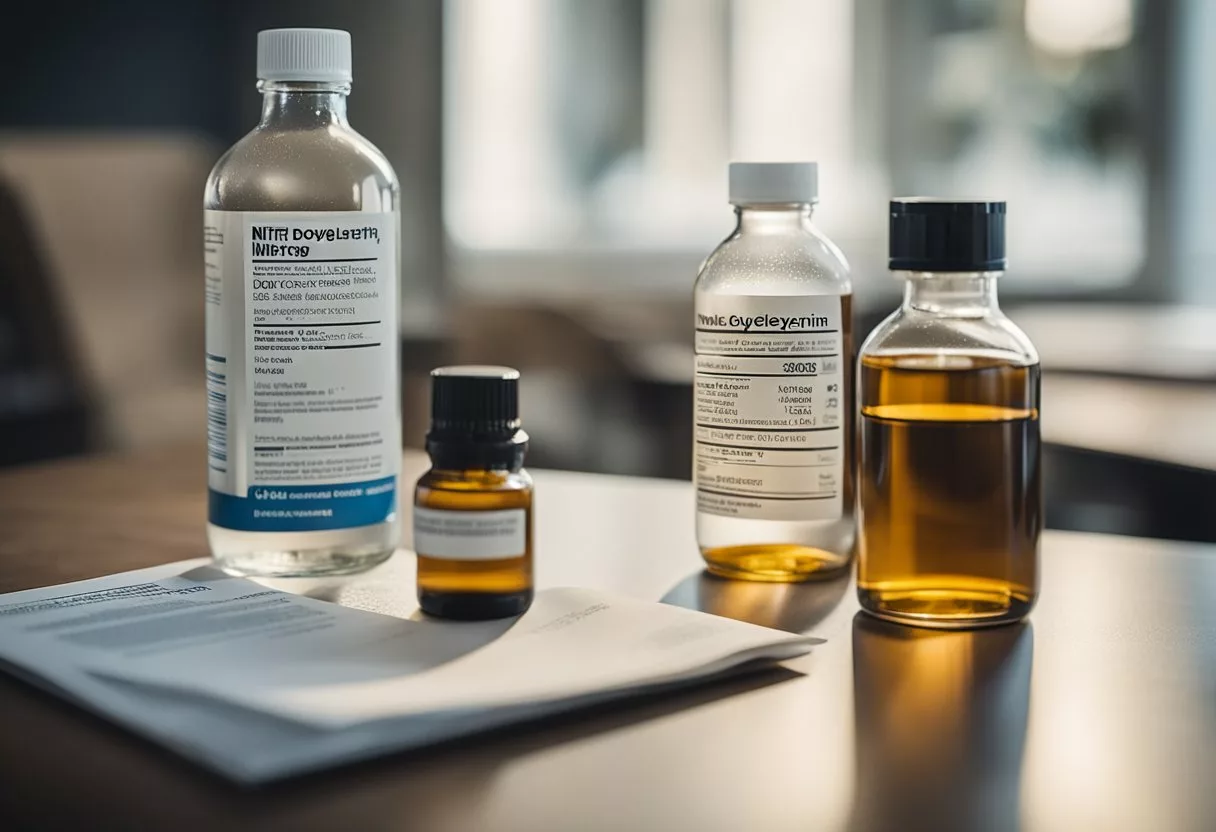Nitroglycerin is a powerful medication used to treat chest pain in people with heart problems. It works by relaxing blood vessels[1] and improving blood flow to the heart. But what happens if someone without heart issues takes it?
Taking nitroglycerin without heart problems can cause a sudden drop in blood pressure, leading to dizziness, fainting, and other serious side effects. This medication is not meant for casual use. It’s a prescription drug designed for specific heart conditions.
People without heart issues should never take nitroglycerin. It can be dangerous and may interfere with other medications. Always follow a doctor’s advice about using any heart medications.
Key Takeaways
- Nitroglycerin is only for people with specific heart conditions
- Taking it without heart problems can cause dangerous side effects
- Never use nitroglycerin without a doctor’s prescription and guidance
Understanding Nitroglycerin
Nitroglycerin is a powerful medication used to treat heart conditions. It works quickly to improve blood flow and reduce strain on the heart. Doctors prescribe it in different forms for various heart-related issues.
Mechanism of Action
Nitroglycerin relaxes smooth muscle within blood vessel walls[1]. This causes blood vessels to widen, improving blood flow. The drug mainly affects veins, which reduces the amount of blood returning to the heart.
This action lowers the heart’s workload. It also increases oxygen supply to the heart muscle. These effects help relieve chest pain from angina.
Nitroglycerin acts rapidly when taken under the tongue. It can start working within 1-3 minutes.
Indications for Nitroglycerin
Doctors mainly prescribe nitroglycerin to treat and prevent angina. Angina is chest pain caused by reduced blood flow to the heart. It’s often a symptom of coronary artery disease.
Patients use nitroglycerin for:
- Immediate relief of angina attacks
- Prevention of expected angina episodes
- Long-term management of chronic angina
In some cases, doctors may use nitroglycerin to treat heart attacks. It can also help control blood pressure during surgery.
Forms of Nitroglycerin
Nitroglycerin comes in several forms:
- Sublingual tablets[2]: Placed under the tongue for quick relief
- Sprays: Sprayed under the tongue, also for fast action
- Patches: Applied to the skin for long-term angina prevention
- Ointments: Rubbed on the skin for extended release
- Intravenous: Given through a vein in hospital settings
Each form has specific uses and duration of action. Sublingual tablets and sprays work fastest for immediate angina relief. Patches and ointments provide longer-lasting effects for prevention.
When Nitroglycerin Is Taken Without Heart Issues
Taking nitroglycerin without heart problems can lead to various effects on the body. These range from mild discomfort to potentially serious health risks.
Potential Cardiovascular Effects
Nitroglycerin widens blood vessels, which can cause a sudden drop in blood pressure. This may lead to dizziness or fainting, especially when standing up quickly. The heart might beat faster to make up for the lower blood pressure.
In people without heart issues, nitroglycerin can affect how blood flows through veins and arteries. This change in blood flow might cause:
- A feeling of lightheadedness
- Warmth or flushing in the face and neck
- Temporary changes in heart rate
Common Side Effects
Even without heart problems, nitroglycerin can cause several side effects:
- Headaches, often described as throbbing
- Dizziness or a spinning sensation
- Nausea or upset stomach
- Vomiting in some cases
- Skin flushing, making the face look red
These effects usually don’t last long. They happen because nitroglycerin relaxes smooth muscles in blood vessel walls.
Serious Adverse Reactions
While rare, serious reactions can occur when taking nitroglycerin without heart issues:
- Severe allergic reactions, including:
- Trouble breathing
- Swelling of the face, lips, tongue, or throat
- Hives or rash
- Dangerously low blood pressure, which may cause:
- Fainting
- Confusion
- Weak pulse
- In rare cases, high blood pressure[3] might occur as a rebound effect.
People with certain health conditions may be at higher risk for these reactions. It’s crucial to use nitroglycerin only under a doctor’s guidance.
Interactions and Contraindications
Nitroglycerin can interact with various medications and activities, potentially causing serious health effects. It’s crucial to be aware of these interactions to avoid dangerous complications.
Drug Interactions
Nitroglycerin can interact with many drugs[4], including medications for erectile dysfunction. Sildenafil (Viagra), tadalafil (Cialis), and vardenafil (Levitra) can cause a dangerous drop in blood pressure when taken with nitroglycerin.
Other important drug interactions include:
- Nitrates: Combining different nitrate medications can lead to severe hypotension.
- Ergotamine: This migraine medication can reduce nitroglycerin’s effectiveness.
- Riociguat: Taking this with nitroglycerin may cause extreme low blood pressure.
- Aspirin: May increase nitroglycerin’s blood-thinning effects.
Patients should always inform their doctor about all medications they’re taking, including over-the-counter drugs and supplements.
Non-Pharmacological Interactions
Certain activities and substances can affect how nitroglycerin works in the body. Alcohol can intensify nitroglycerin’s effects, potentially causing dizziness or fainting.
Exercise and stress can impact nitroglycerin’s effectiveness. Physical activity may increase the need for the medication, while stress can reduce its efficacy.
Eating large meals before taking nitroglycerin can delay its absorption. Patients should avoid lying down immediately after taking the medication, as this can affect its distribution in the body.
It’s important to discuss any lifestyle changes with a healthcare provider to ensure safe and effective use of nitroglycerin.
Guidance on Proper Use

Proper use of nitroglycerin is crucial for safety and effectiveness. The right techniques and knowing when to get help are key.
Administration Techniques
Nitroglycerin comes in different forms. For tablets, place them under the tongue[5] and let them dissolve. Don’t swallow, chew, or crush them.
For sprays, use 1-2 sprays under the tongue. Wait 5 minutes between doses. Don’t use more than 3 sprays in 15 minutes.
Patches go on clean, dry skin. Change them daily. Put new patches in different spots to avoid skin irritation.
Always sit or lie down when using nitroglycerin. This helps prevent dizziness.
When to Seek Medical Attention
Call for help if chest pain doesn’t improve after 3 doses in 15 minutes. This could be a sign of a heart attack.
Get medical advice if you feel very dizzy, weak, or have a bad headache after taking nitroglycerin. These may be signs of low blood pressure.
Talk to a doctor if you need to use nitroglycerin more often than usual. This might mean your heart condition is getting worse.
Seek help right away for any new or strange symptoms. Don’t ignore chest pain that feels different from your usual angina.
Special Considerations
Taking nitroglycerin without heart problems requires careful thought. Certain groups face unique risks, and managing side effects is key.
Considerations for Specific Populations
Pregnant women should avoid nitroglycerin unless absolutely needed. It may harm the baby. Breastfeeding mothers should be cautious[3], as the drug can pass into breast milk.
Children rarely use nitroglycerin. Doctors only give it in special cases. People with anemia need extra care. The drug can worsen their condition.
Elderly patients often need lower doses. Their bodies may process the drug differently. This can lead to stronger effects.
Managing Side Effects and Tolerance
Headaches are common with nitroglycerin use[1]. They usually fade as the body adjusts. Taking the drug with food may help.
Dizziness can occur due to low blood pressure. Standing up slowly can prevent falls.
Some people develop tolerance over time. This means the drug may work less well. Doctors may adjust doses to manage this issue.
A slow heartbeat can happen in rare cases[6]. Patients should report this to their doctor right away.
Regular check-ups help catch problems early. Proper storage of nitroglycerin is crucial. It keeps the medicine working well.
Storage and Handling

Nitroglycerin is a sensitive medication that requires careful storage and handling. Keep it in its original container, which is designed to protect it from light and moisture.
Store nitroglycerin at room temperature, away from heat and direct sunlight. Avoid placing it in bathrooms or near kitchen sinks where humidity can affect the medication.
The FDA recommends[7] keeping nitroglycerin tablets in their original glass bottle. This helps maintain their potency and effectiveness.
Check the expiration date regularly. Replace the medication if it has expired or if the tablets have a strong vinegar smell, which indicates they have degraded.
When using nitroglycerin, it’s important to:
- Sit down before taking the medication
- Open the bottle carefully
- Take out the required dose without touching other tablets
- Close the bottle tightly immediately after use
Always carry nitroglycerin with you, but avoid storing it in hot places like car glove compartments. Heat can reduce its effectiveness.
If you notice any changes in the appearance or smell of your nitroglycerin, consult a healthcare professional. They can advise if the medication is still safe to use.
Frequently Asked Questions
Nitroglycerin use in people without heart problems can have various effects and risks. Understanding these impacts is crucial for safe usage and proper precautions.
What are the potential side effects of using nitroglycerin in individuals without heart conditions?
People without heart issues may still experience side effects from nitroglycerin[8]. These can include headaches, dizziness, and lightheadedness. Some individuals might feel flushed or notice a warm sensation in their face and neck.
Nitroglycerin can also cause a rapid heartbeat or difficulty breathing in some cases. These effects occur due to the medication’s action on blood vessels, even in the absence of heart problems.
How does nitroglycerin interact with the body when no cardiac issues are present?
Nitroglycerin works by relaxing blood vessels[1] throughout the body. This action occurs regardless of whether a person has heart issues or not.
In individuals without heart problems, this relaxation can lead to a drop in blood pressure. The body may respond by increasing heart rate to compensate for the lower blood pressure.
Can individuals without heart problems safely use nitroglycerin for other medical purposes?
Nitroglycerin is primarily used for heart-related conditions. Its use in people without heart problems is uncommon and should only occur under strict medical supervision.
Some doctors may prescribe nitroglycerin for other conditions that involve blood vessel constriction. However, this is not typical and requires careful monitoring.
What precautions should be taken when someone without a history of heart problems is prescribed nitroglycerin?
Individuals without heart problems who are prescribed nitroglycerin should inform their doctor of all medications they are taking. This is crucial because nitroglycerin can interact with other drugs.
They should also be aware of potential side effects and report any unusual symptoms to their healthcare provider. Regular check-ups to monitor blood pressure and heart rate are important.
Are there any immediate risks of administering nitroglycerin to a person not suffering from a heart attack?
Administering nitroglycerin to someone not having a heart attack can cause a sudden drop in blood pressure. This might lead to fainting or dizziness.
In rare cases, it could trigger a rapid heartbeat or breathing difficulties[8]. These risks underscore the importance of using nitroglycerin only as prescribed by a healthcare professional.
How long does the effect of nitroglycerin last in the system, and what impact does this have on non-heart related conditions?
The effects of nitroglycerin are typically short-lived, lasting about 30 minutes to an hour. This brief duration limits its impact on non-heart related conditions.
However, repeated doses or extended-release forms can prolong these effects. In people without heart problems, this could lead to persistent low blood pressure or headaches.
References
- Nitroglycerin Patient Tips: 7 things you should know. https://www.drugs.com/tips/nitroglycerin-patient-tips Accessed October 23, 2025
- Nitroglycerin: Uses & Side Effects. https://my.clevelandclinic.org/health/drugs/20423-nitroglycerin-sublingual-tablets Accessed October 23, 2025
- Nitroglycerin: Uses, dosage, side effects, risks, and interactions. https://www.medicalnewstoday.com/articles/325187 Accessed October 23, 2025
- Nitroglycerin Interactions Checker. https://www.drugs.com/drug-interactions/nitroglycerin.html Accessed October 23, 2025
- A cardiologist’s advice on how to use this “wonder drug” – Heart Sisters. https://myheartsisters.org/2013/08/19/nitroglycerin/ Accessed October 23, 2025
- Nitroglycerin: Side Effects, Dosage, Uses, and More. https://www.healthline.com/health/drugs/nitroglycerin-sublingual-tablet Accessed October 23, 2025
- Nitroglycerin (oral route, sublingual route) - Side effects & dosage. https://www.mayoclinic.org/drugs-supplements/nitroglycerin-oral-route-sublingual-route/proper-use/drg-20072863 Accessed October 23, 2025
- Nitroglycerin Side Effects: Common, Severe, Long Term. https://www.drugs.com/sfx/nitroglycerin-side-effects.html Accessed October 23, 2025
